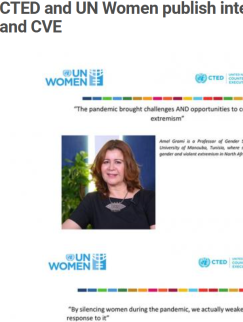This publication features the transcripts from a series of interviews with four experts in gender and counter-terrorism and preventing and countering violent extremism (CT/PCVE) from Egypt, Libya, Morocco, and Tunisia. The interview series was conducted by the UN Counter-Terrorism Executive Committee Directorate (CTED) in partnership with UN Women as a part of the Expert Platform on Gender and Preventing and Countering Violent Extremism in North Africa. The interview series seeks to understand how the COVID-19 pandemic affected the gendered dimensions of violent extremism, and the work of researchers and civil society actors working in CT/PCVE across North Africa.
Each interview focuses on a different element, including the increased isolation individuals and marginalised communities feel (i.e., a risk factor for radicalisation); increased instances of sexual and gender-based violence (i.e., a vulnerability for women); the marginalisation and exclusion of women (i.e., an early warning indicator of violent extremism); and working with victims of terrorism and deradicalisation efforts through online mediums can be more challenging (i.e., difficulty in establishing trust and rapport).
*This interview series is available in English and Arabic via the link.
